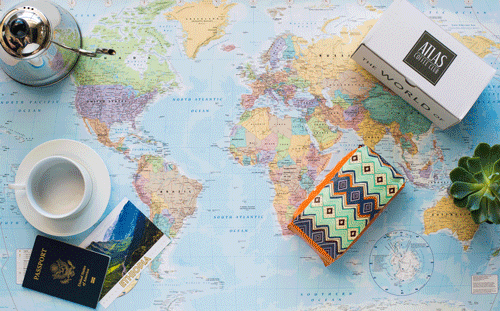HOW TO STORE COFFEE
Bags are packed, the Volkswagen’s padded with snacks and everyone’s ready to hit the road. But just like the van needs gas to refuel, your gaggle of cohorts need coffee to keep up their cross-country energy – and arid Nevada and or Yosemite Park aren’t exactly brimming with third-wave coffee shops. That means you’ll need to find a spot to store coffee in your adventure mobile, and preferably not in the cooler with the beer.
Here are five points to know for storing coffee beans for your road trip. And yes, these apply to your household storage as well.
Here are five points to know for storing coffee beans for your road trip. And yes, these apply to your household storage as well.

Your coffee’s original packaging does a pretty good job on its own. If your road trip is a two-weeker, and you’ve just purchased your bag of coffee beans, your bag will most likely be just fine for storing the coffee – assuming it follows the standard one-way valve that releases gas and keeps out oxygen. (Look for that tiny “belly button” on the middle-front of the bag.) As a safe guard for your trip, buy a few bags of coffee and open them at different points of your journey. For the traveler looking for less fuss, this may be the, shall we say, best route. But maybe still tuck it in the glove box – you’ll appreciate the extra layer of protection when, reaching for a pick-me-up after a long drive, your fresh-brewed coffee kisses your tongue
Take a world tour of amazing coffee

Take a world tour of amazing coffee
- Coffee you can’t find on the shelves
- Roasted fresh & delivered to you
- Tailored to your preferences
- All for under $.30 a cup

Coffee beans are very, very finnicky. To know upfront is that coffee beans are a sensitive food item – more comparable to keeping flour fresh than sugar. Beans react negatively to four elements: air, temperature, light and moisture. So, regardless of how you ultimately decide to store your beans, remember those elements and how your storage method or container may interact with them.
No, don’t ground the beans before your trip. Sadly, grinding the coffee ahead of time means your beans will oxidize well in advance of the brewing, as well as lose some of the surface area that allows for flavor notes to shine through. The point: Store beans, not grounds. Really, try to avoid buying bagged grounds altogether, unless you know you’ll consume them quickly – once ground, it’s as if a knight’s been stripped of armor, only susceptible to a burst of oxygen instead of a sword strike.

The airtight container: The savior of your favorite coffee. Truly, the easiest way to keep your newly purchased road-trip coffee fresh – aside from buying coffee that’s been roasted in the past two weeks, of course – is to invest in an airtight, opaque container. That bad boy will do most of the work in keeping your coffee fresh; from there, all you need to do is make sure it’s tucked away in a dry and dark environment. Like, say, a glove box.
You can freeze your coffee ahead of time, but you probably don’t want to.
Look, there’s nothing wrong with freezing your coffee beans, per se. If they’re well-sealed and kept away from other foods (for no longer than six months), they should be fine if used soon after being taken out. However, by freezing in advance, you risk the usual nuisances like freezer burn and ruining your beans with moisture. And, it goes without saying, don’t refrigerate your beans – they’re porous little buggers, so unless you want your coffee to taste like Sunday’s spaghetti, steer clear. To boot: Remember to allow time for defrosting when you finally do grind your beans. Most grinders aren’t built for battle with frozen goods.
For a limited time - Take 50% off of your first shipment of amazing single origin, specialty grade coffee from around the world.